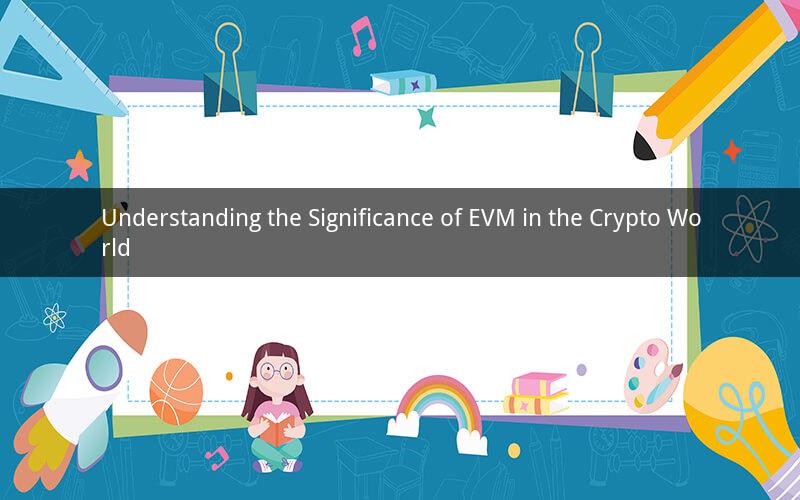
In the ever-evolving landscape of cryptocurrency, the term "EVM" holds significant importance. EVM stands for Ethereum Virtual Machine, a foundational element of the Ethereum network. This article delves into the intricacies of EVM, its purpose, and its role in the crypto universe.
EVM: The Core of Ethereum's Ecosystem
The Ethereum Virtual Machine is an open-source, decentralized software that forms the backbone of the Ethereum blockchain. It serves as a virtual environment where smart contracts can be executed, providing a level of trust and security that is unmatched in the crypto world. EVM allows developers to create decentralized applications (DApps) and tokens that can interact with each other and the blockchain seamlessly.
EVM operates independently of any specific programming language or platform, making it highly versatile. It supports multiple programming languages, including Solidity, Vyper, and AssemblyScript, which enables developers to build innovative and scalable applications.
The Role of EVM in the Crypto Ecosystem
1. Smart Contracts: EVM enables the creation and execution of smart contracts, which are self-executing contracts with the terms of the agreement directly written into lines of code. These contracts run on the Ethereum blockchain, ensuring transparency, security, and reliability. EVM serves as the runtime environment for smart contracts, providing the necessary infrastructure for their execution.
2. Decentralized Applications: EVM facilitates the development of DApps, which are applications that run on a blockchain rather than a centralized server. These applications can be used for various purposes, such as decentralized finance (DeFi), supply chain management, and more. EVM enables DApps to interact with the blockchain and perform transactions, making them decentralized and resistant to censorship and manipulation.
3. Token Creation: EVM enables the creation of tokens on the Ethereum blockchain. Tokens can represent a wide range of assets, from digital currencies to loyalty points and more. The use of EVM in token creation ensures the security and transparency of these tokens, as well as their interoperability with other Ethereum-based applications.
4. Interoperability: EVM serves as a common denominator in the crypto world, enabling interoperability between different blockchain platforms and applications. By providing a consistent runtime environment, EVM ensures that smart contracts and DApps can be ported between different blockchains, fostering a more integrated and interconnected crypto ecosystem.
The Benefits of EVM
1. Security: EVM's decentralized nature ensures that smart contracts and DApps are immune to single points of failure, as the consensus mechanism of the Ethereum network guarantees the execution of these applications. This security makes EVM an ideal choice for sensitive applications, such as financial transactions and digital identities.
2. Flexibility: EVM supports multiple programming languages, which gives developers the flexibility to choose the best-suited language for their projects. This flexibility promotes innovation and encourages a diverse ecosystem of applications and smart contracts.
3. Scalability: EVM's modular design allows for scalability, as new features and improvements can be added without affecting the core functionality of the network. This ensures that the Ethereum network can accommodate the growing demands of the crypto world.
4. Interoperability: EVM's role in promoting interoperability among different blockchains and applications enhances the overall growth and adoption of the crypto industry. By facilitating cross-chain communication, EVM enables the development of a more cohesive and integrated crypto ecosystem.
Frequently Asked Questions
1. Q: What is the difference between EVM and the Ethereum network?
A: EVM is the virtual machine that powers the Ethereum network. It enables the execution of smart contracts and DApps on the blockchain, while the Ethereum network itself is the underlying infrastructure that supports these applications.
2. Q: Can smart contracts be created on any blockchain platform?
A: No, smart contracts can only be created on blockchains that have a virtual machine like EVM. This is because smart contracts require a runtime environment to execute their code.
3. Q: What is the most popular programming language for developing smart contracts on EVM?
A: Solidity is the most popular programming language for developing smart contracts on EVM. It is a high-level language that is designed specifically for writing smart contracts.
4. Q: Can EVM support cross-chain interactions?
A: Yes, EVM can support cross-chain interactions, which means that smart contracts and DApps developed on EVM can interact with other blockchain platforms and applications.
5. Q: Is EVM vulnerable to hacking and cyberattacks?
A: EVM, like any technology, can be vulnerable to hacking and cyberattacks. However, the decentralized nature of the Ethereum network and the robust consensus mechanism make it challenging for attackers to compromise the system.
In conclusion, the Ethereum Virtual Machine (EVM) is a crucial component of the crypto ecosystem. Its role in enabling smart contracts, DApps, and token creation has made it an essential element of the blockchain industry. With its versatile nature, security, and scalability, EVM is set to play a pivotal role in the future of cryptocurrencies.